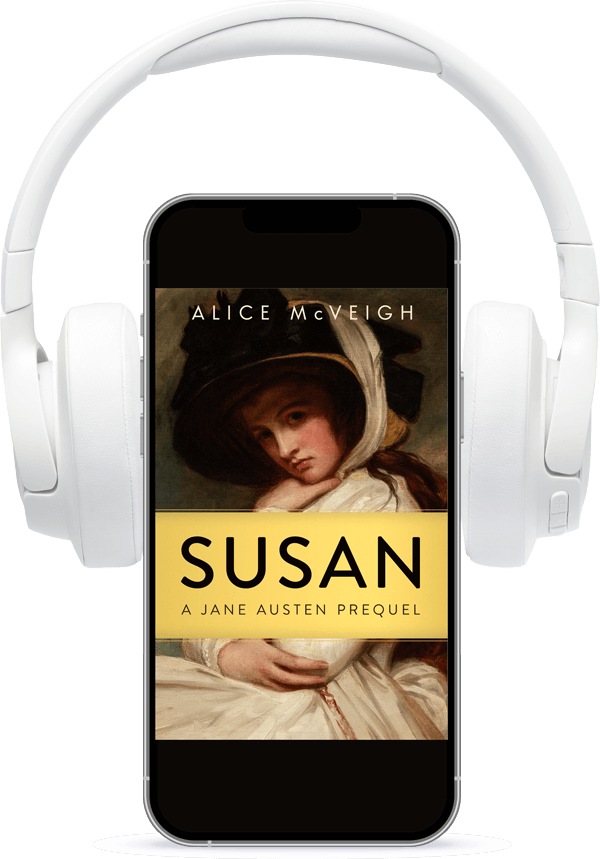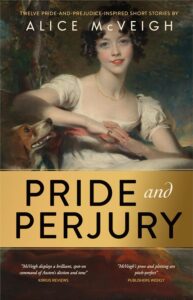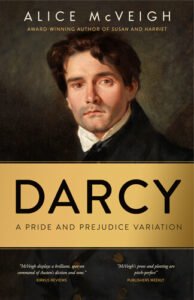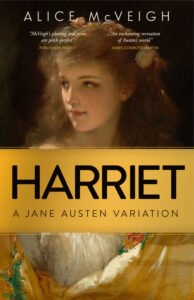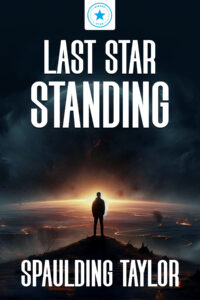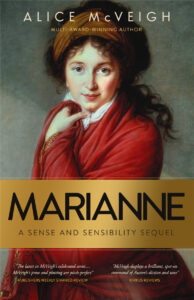
SUSAN
By Alice McVeigh
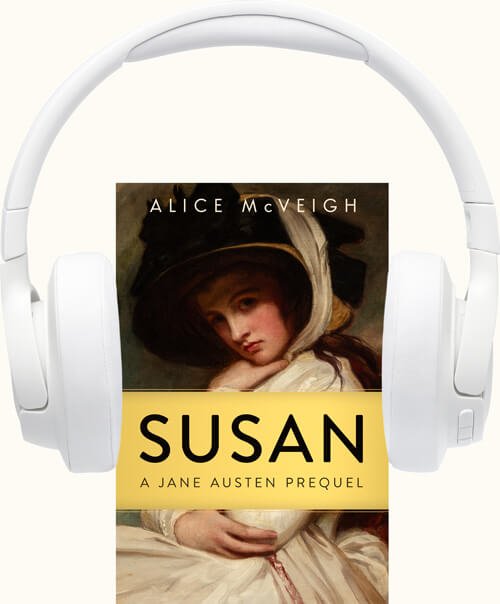
SUSAN – an extract
McVeigh’s Susan was inspired by her wondering what the wicked 35-year-old Lady Susan Vernon, from Austen’s novella, might have been like, at just sixteen.
After being expelled from her London ladies’ school, Susan has the great good luck to charm Lady Catherine de Bourgh, who takes her under her wing. Unluckily, she also entrances a young nobleman, a circumstance which alarms her uncle/guardian. He sends her on an extended visit to his brother in Hunsford, Kent – her other uncle and aunt being none other than Mr and Mrs Collins (from Pride and Prejudice). However, there is temptation everywhere, if one is as young, pretty and mettlesome as Susan is, at sixteen…
Excerpt from Susan: A Jane Austen Prequel:
Susan rushed from the chair to her uncle’s door, recalling some of Aunt Emily’s warnings. (‘A gentleman will never restrain you. Should this happen, you must instantly reprove him’… ‘A woman’s reputation is her most precious asset. Any rumour that she might be likely to yield is itself a stain, which might never be erased.’)
But had she truly been restrained by Mr Oliver? She had been some danger of falling, which might serve as his excuse – but she could not forget the moment when she had tried to move, and he had held her.
Only the dozing housekeeper awaited her: her aunt and uncle, in full dependence on her ladyship, had long since retired. Susan accepted a lit candle and ascended the stairs, still nervously wondering, ‘Am I safe?’
She was not to know until the morning.
A second excerpt:
Lady Catherine started, saying, ‘Nay, I was not asleep. You should take care not to sink your tone at the end of a section, Miss Smithson. Now, be so good as to play to me upon the pianoforte.’
Susan seated herself at the instrument, recalling an early work by Corri, which she had recently memorised. Lady Catherine beat time with her forefinger throughout and at its conclusion announced that she had always been devoted to Haydn. But when Susan enquired whether she might like another air, she said, ‘No. You may go, Miss Smithson – but come tomorrow at half-past two, to read to me again.’
Susan, hiding her dancing eyes, promised to attend her with the greatest pleasure. However, back at home, Aunt Emily took some time to quite believe her. ‘What, she summoned you, and with such little ceremony? And you read for so long a time?’
‘I doubt she was aware of the time, but I was quite hoarse by the end of it.’
‘And you are really to return tomorrow?’
‘So she said, though she might as easily dispatch me home again. She might go out – she might forget. She is – capricious.’
ISBN: 978-1916882317
Publication: June 2021
Publisher: Warleigh Hall Press
Editions: Paperback, ebook, audiobook
Amazon bestseller, rated 10/10 by Publishers Weekly's BookLife Prize
A Jane Austen Prequel
“She possesses an uncommon union of symmetry, brilliancy, and grace. One is apt to expect that an impudent address will naturally attend an impudent mind – but her countenance is absolutely sweet. I am sorry it is so, for what is this but deceit?”
— from Jane Austen’s Lady Susan.
Sixteen-year-old Susan Smithson – pretty but poor, clever but capricious – has just been expelled from a school for young ladies in London.
At the mansion of the formidable Lady Catherine de Bourgh, she attracts a raffish young nobleman. But, at the first hint of scandal, her guardian dispatches her to her uncle Collins’ rectory in Kent, where her sensible cousin Alicia lives and “where nothing ever happens.”
Here Susan mischievously inspires the local squire to put on a play, with consequences no one could possibly have foreseen. What with the unexpected arrival of Frank Churchill, Alicia’s falling in love and a tumultuous elopement, rural Kent will surely never seem safe again…
Click here to read about the Warleigh Hall Press Jane Austen series.
Awards
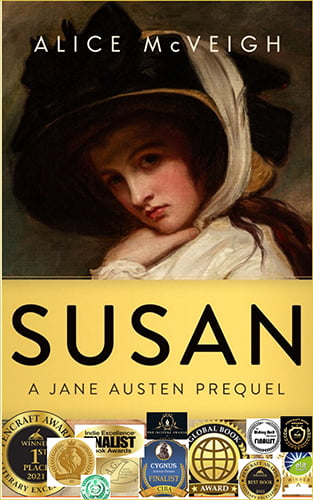
Quarterfinalist for Publishers Weekly’s BookLife Prize 2021 (rated 10/10)
Winner: First Place PenCraft Book Awards (historical), 2021
Winner: Gold Medal Historical Fiction Company Book Awards, 2022
WINNER: First place (historical) Incipere Book Awards 2022
Winner: Gold Medal (historical) Global Book Awards, 2021
Winner: Gold Medal eLit Book Awards (historical fiction)
Winner: Gold Medal first Winter Great Reads Book awards, Pencraft Book Awards 2022
Finalist for IAN (Independent Author Network) “Book of the Year 2024”
Honoree: IndieBRAG medallion, 2021
Honorable Mention (fourth) in literary fiction, Readers Favorite International Book Awards
Finalist: Indie Excellence Book Awards
Selected: as one of “100 notable Indies of 2021” by Shelf Unbound Magazine
Finalist: Wishing Shelf Awards (audio)
Finalist: Chanticleer’s Goethe Award (historical fiction)
Finalist Rone Awards (audio)
“Recommended” US Review of Books
First place winner, Chanticleer International Book Award BOOK SERIES (historical, 2023)
Silver medal, Global Book Awards 2024 (Book series, fiction)
Susan is at the moment on a special offer and exclusive to Amazon. For this reason, the links to alternative retailers below will not work for now. Apologies for any inconvenience.
Reviews for Susan
Multiple award-winning author











Susan is now available as an audiobook
Finalist in The Wishing Shelf Book Awards (adult audiobook category)
Finalist in the current Rone Awards (In D’Tale magazine, audiobook category)
Narrated by Heather Tracy.
